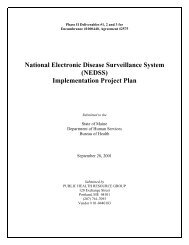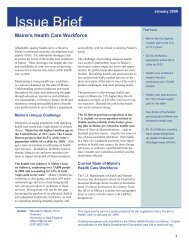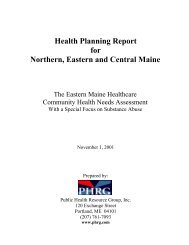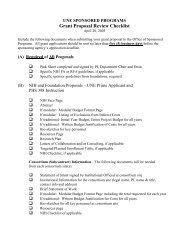Acute Flaccid Paralysis Accompanying West Nile Meningitis Ahmed ...
Acute Flaccid Paralysis Accompanying West Nile Meningitis Ahmed ...
Acute Flaccid Paralysis Accompanying West Nile Meningitis Ahmed ...
Create successful ePaper yourself
Turn your PDF publications into a flip-book with our unique Google optimized e-Paper software.
Adult Typhilitis Associated With Lymphoma and Steroid Use <br />
Anderson, BD, D.O., Welzbacher, K, D.O.<br />
Kent Hospital, Department of Emergency Medicine, Warwick, RI<br />
INTRODUCTION: Typhilitis is a necrotizing inflammatory condition usually involving the<br />
terminal ileum or ascending colon. Typhilitis was first described in children with leukemia<br />
and severe neutropenia. It most commonly occurs in the setting of immunocompromise,<br />
chemotherapy, and or chronic steroid use with a mortality rate approaching 50%.<br />
CASE: A 69-year-old white male presents to the Emergency Department with the acute<br />
onset of diffuse abdominal pain progressive for six hours. He describes a moderate to<br />
severe pain that worsens with minimal movement. He reports associated subjective<br />
fever, four episodes of nonbloody diarrhea with nausea, and mild shortness of breath.<br />
He denies trauma to his abdomen. He reports mild episodes of similar abdominal pain<br />
over the past year. The patient was suspected to be experiencing abdominal pain upon<br />
initial evaluation likely from perforated appendicitis or perforated small bowel obstruction<br />
with sepsis.<br />
Portable chest X-ray, laboratory studies, and an abdominal flat and upright X-ray<br />
series were initially ordered. Following review of his laboratory findings, his profound<br />
neutropenia was thought to be due to profound sepsis. The patient was placed on<br />
monitoring and given oxygen by nasal cannula. Intravenous (IV) access was<br />
established and the patient was given empiric broad spectrum antibiotics. Morphine pain<br />
medication was additionally given along with Acetaminophen for fever and fluid<br />
resuscitation was initiated with normal saline(NS). After reviewing the nonspecific<br />
findings on the abdominal X-ray series with the consulting surgeon a CT of the abdomen<br />
with oral and IV contrast was ordered to better define the diagnosis and assist with<br />
planning a surgical procedure.<br />
Computerized Tomography(CT) results revealed evidence small bowel perforation at<br />
the distal ileum with ileocolonic wall thickening suggestive of bowel necrosis and<br />
typhlitis. The consulting surgeon took the patient to the operating room following stress<br />
dose steroid administration for possible adrenal insufficiency. A small bowel resection<br />
was performed and an ileostomy was created. He remained in the Intensive Care Unit<br />
for two days and was discharged to a rehab facility following a 10 day hospitalization.<br />
DISCUSSION: This perforation was thought to occur from a process known as typhilitis,<br />
a necrotizing inflammatory condition usually involving the terminal ileum or ascending<br />
colon. The exact cause of typhilitis remains unknown however the mechanism is thought<br />
to be due to a combination of inflammation and possible acute infection<br />
(Cytomegalovirus, Pseudomonas aeruginosa), mucosal hemorrhage, and possible<br />
neoplastic infiltration.<br />
Typhlitis is usually seen at the neutropenic nadir, usually 7 to 14 days following<br />
chemotherapy. These patients will present with abdominal pain, usually right lower<br />
quadrant in nature, and fever. Differentiating typhlitis from other infections such as<br />
appendicitis is nearly impossible without imaging.<br />
The cause of our patient’s typhilits is unclear; however he was at great risk given his<br />
history of chronic steroid use for ongoing ileal inflammation, his relative<br />
immunocompromise, and his prior history of chemotherapy.

















